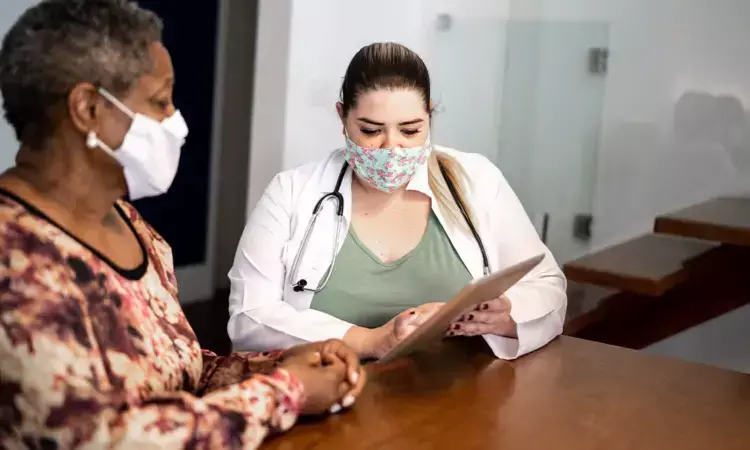- Home
- Medical news & Guidelines
- Anesthesiology
- Cardiology and CTVS
- Critical Care
- Dentistry
- Dermatology
- Diabetes and Endocrinology
- ENT
- Gastroenterology
- Medicine
- Nephrology
- Neurology
- Obstretics-Gynaecology
- Oncology
- Ophthalmology
- Orthopaedics
- Pediatrics-Neonatology
- Psychiatry
- Pulmonology
- Radiology
- Surgery
- Urology
- Laboratory Medicine
- Diet
- Nursing
- Paramedical
- Physiotherapy
- Health news
- Fact Check
- Bone Health Fact Check
- Brain Health Fact Check
- Cancer Related Fact Check
- Child Care Fact Check
- Dental and oral health fact check
- Diabetes and metabolic health fact check
- Diet and Nutrition Fact Check
- Eye and ENT Care Fact Check
- Fitness fact check
- Gut health fact check
- Heart health fact check
- Kidney health fact check
- Medical education fact check
- Men's health fact check
- Respiratory fact check
- Skin and hair care fact check
- Vaccine and Immunization fact check
- Women's health fact check
- AYUSH
- State News
- Andaman and Nicobar Islands
- Andhra Pradesh
- Arunachal Pradesh
- Assam
- Bihar
- Chandigarh
- Chattisgarh
- Dadra and Nagar Haveli
- Daman and Diu
- Delhi
- Goa
- Gujarat
- Haryana
- Himachal Pradesh
- Jammu & Kashmir
- Jharkhand
- Karnataka
- Kerala
- Ladakh
- Lakshadweep
- Madhya Pradesh
- Maharashtra
- Manipur
- Meghalaya
- Mizoram
- Nagaland
- Odisha
- Puducherry
- Punjab
- Rajasthan
- Sikkim
- Tamil Nadu
- Telangana
- Tripura
- Uttar Pradesh
- Uttrakhand
- West Bengal
- Medical Education
- Industry
No impact of PCSK9 inhibitors on glucose metabolism among patients of hypercholesterolemia with prediabetes

Spain: A recent real-life study published in Cardiovascular Diabetology has shed light on the impact of PCSK9 inhibitors in glycaemic control and new-onset diabetes in patients treated for at least three years.
The researchers found a nonsignificant increase in new-onset diabetes mellitus (NODM) in the PCSK9i group, particularly in patients with prediabetes. Overall, the findings suggested that the effect of PCSK9 inhibitors on glucose metabolism may not be a significant concern in clinical practice.
Clinical trials, Mendelian randomisation studies and meta-analyses have demonstrated the diabetogenic effect of statins. According to large clinical trials, PCSK9 inhibitors have no adverse impact on glucose metabolism. However, few real-life studies have yet assessed the long-term effects of these drugs on glucose homeostasis and their impact on new-onset diabetes.
To fill this knowledge gap, Ana M. González-Lleó and colleagues from Spain aimed to examine the development of glucose metabolism disorders and new-onset DM in patients with hypercholesterolemia receiving treatment with PCSK9 inhibitors.
For this purpose, the researchers studied 218 patients treated with either evolocumab or alirocumab (70% with familial hypercholesterolemia) for at least three years (PCSK9iG). They studied the NODM rate in the nondiabetic group at baseline (168) and overall glucose metabolism control in the whole group.
A comparison of incidental diabetes mellitus was drawn between the two groups. The first was a propensity score matching (PSM)-selected group (n = 168) from the database of patients attending the Reus lipid unit (Metbank, n = 745) who were not on PCSK9i (PSMG). The second was a subgroup with a similar age range (n = 563) of the Di@bet.es study (Spanish prospective study on diabetes development n = 5072) (D@G). The incidence was determined as the percentage of NODM cases per year.
The researchers reported the following findings:
· There was an increase in fasting glucose (FG) level of the subjects with normoglycaemia at baseline from 91 to 93 mg/dL.
· There were 14 NODM cases in the PCSK9i group (2.6%/y), all among people with prediabetes at baseline.
· The incidence of NODM in PSMG and D@G was 1.8%/y (compared with the PCSK9Ig).
· The incidence among the subjects with prediabetes was 5.1%/y in the PCSK9iG, 4.8%/y in the PSMG and 3.9%/y in the D@G.
· In the multivariate analysis, only the FG level was associated with the development of NODM in the PCSK9iG (OR 1.1).
· There was no significant change in FG or A1c levels in patients with diabetes at baseline.
The study revealed that in the PCSK9iG, a nonsignificant increase in NODM occurred, particularly in patients with prediabetes, compared with the PSMG and D@G groups. Baseline FG levels were the main variable associated with diabetes development. In the subjects who had DM at baseline, there was no change in glucose control.
"Our findings do not support a clinically relevant effect of PCSK9 on the risk of diabetes," the researchers wrote. "In any case, the impact of PCSK9i on glucose homeostasis, if any, should not modify the clinical decision-making process concerning the prescription of these therapies."
Reference:
González-Lleó AM, Sánchez-Hernández RM, Plana N, Ibarretxe D, Rehues P, Ribalta J, Llop D, Wägner AM, Masana L, Boronat M. Impact of PCSK9 inhibitors in glycaemic control and new-onset diabetes. Cardiovasc Diabetol. 2024 Jan 3;23(1):4. doi: 10.1186/s12933-023-02077-y. PMID: 38172901; PMCID: PMC10765818.
Dr Kamal Kant Kohli-MBBS, DTCD- a chest specialist with more than 30 years of practice and a flair for writing clinical articles, Dr Kamal Kant Kohli joined Medical Dialogues as a Chief Editor of Medical News. Besides writing articles, as an editor, he proofreads and verifies all the medical content published on Medical Dialogues including those coming from journals, studies,medical conferences,guidelines etc. Email: drkohli@medicaldialogues.in. Contact no. 011-43720751


